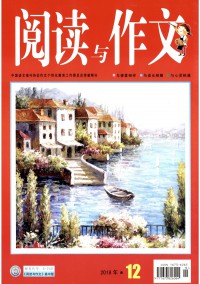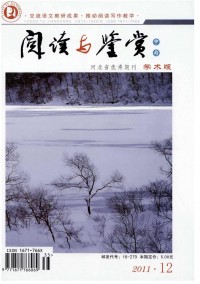閱讀理解
前言:想要寫出一篇令人眼前一亮的文章嗎?我們特意為您整理了5篇閱讀理解范文,相信會為您的寫作帶來幫助,發現更多的寫作思路和靈感。
閱讀理解范文第1篇
關鍵詞:閱讀理解 詞匯積累 閱讀技能 課內閱讀 課外閱讀
中圖分類號:G632 文獻標識碼: C 文章編號:1672-1578(2012)08-0125-02
俗話說:得閱讀者得天下。培養學生閱讀理解能力是高中英語教育的重要目標之一。閱讀理解,題量大、難度大,句子結構復雜,通常有5%-10%的生詞量,分值約占高考試卷總分的30%;同時,聽力、單選、完形填空、閱讀表達、書面表達等題型的答題效果,也直接或間接地由學生的閱讀能力所決定。由此可見,學生閱讀理解能力的強弱,在一定程度上決定著英語高考的成敗,體現著高中英語教學成效的好壞。
在多年的高中英語教學實踐中,筆者發現這樣一個現象:做閱讀理解對于不少學生來說是一件“苦差事”。部分學生,尤其是英語基礎不好的學生在做閱讀理解題目時存在著恐懼心理,認為這類試題太難,無從下手。還有一些有一定語言基礎的學生也是在“硬讀”、“苦讀”,閱讀理解依然是失分較多的題型。
語言學習的規律告訴我們:新的語言知識從輸入到運用,有一個內化的過程,完成這個過程需要接觸語言的機會。機會越多,語言的應用就越熟練,而閱讀的過程正是認知語言的絕好機會。實踐證明,閱讀可以鞏固和擴大詞匯量,豐富語言知識,提高語言運用能力;可以訓練思維能力、理解能力、概括能力與判斷能力;還有一點相當重要,閱讀能夠培養學生學習英語的興趣。因此,教師在高中英語教學中應注重閱讀教學,側重于培養學生的閱讀興趣和閱讀理解能力,使學生變做閱讀理解為“悅”讀理解。
1 積累詞匯與提高閱讀理解能力相輔相成
1.1良好的詞匯積累方式是實現輕松閱讀的前提
詞匯是構成語言最基本的要素。如何讓學生更多更好地積累詞匯呢?引導學生養成良好的詞匯積累方式是關鍵。在教學中,筆者注重引導學生采取音形意相結合的方式記單詞。一方面,針對英語是表音文字的特點,培養學生根據發音來拼寫單詞的習慣;另一方面,指導學生運用構詞法來擴充詞匯量,例如:合成法grown-up;派生法en+courage=encourage;轉換法free(adj.)--free(v.)。
1.2堅持閱讀是鞏固和擴充詞匯量的保證
閱讀的過程是詞匯反復再現的過程,而且只有在具體的語境中,學生才會對詞匯搭配和詞性產生感性認識。在日常教學中,筆者引導學生養成堅持閱讀的良好習慣,在閱讀中弱化生詞的重要性,使其流暢閱讀。在閱讀后,指導學生將重要詞匯和高頻詞匯摘錄到生詞本上,常添加、常翻閱,從而使學生在閱讀過程中實現對詞匯的鞏固、擴充和循環應用。
2 優化閱讀習慣,培養閱讀技能
2.1提高閱讀速度
閱讀速度的快慢是閱讀理解能力高低的重要標志之一。在教學中,筆者發現不少學生有譯讀、回讀、指讀等壞習慣,這不僅會影響閱讀速度,而且還會阻礙英語思維的發展。如何提高閱讀速度呢?養成以意群為單位進行閱讀的習慣非常重要。意群是指由單詞組成的表意單位。閱讀時可以指導學生先將句子劃分為幾個意群,并按意群默讀,漸漸養成將句子一眼看到底的習慣,久而久之,學生就可以“一目十行”。
2.2根據上下文(語境)來推測詞義
語言學家認為,“閱讀是一種心理語言的猜測游戲,是一個選擇過程,在獲得這個心理語言活動過程中,學生根據語言符號不斷的猜測、舍取,然后檢測自己的猜測是否正確。”推測詞義的方法有很多,如:從句子的結構推測詞義、詞性;借助作者在下文對詞意的解釋;利用構詞法猜測詞義;運用常識進行判斷等等。值得一提的是,同一單詞往往會因語境不同而產生詞義變化,根據上下文推測詞義,將有效跨越生詞障礙。
2.3學英語也要學文化
語言和文化是密不可分的,學習語言脫離其文化背景就等于是“紙上談兵”。文化背景知識是決定學生閱讀成敗的重要因素之一。英語教學一方面是文化知識的傳授,另一方面也是跨文化意識的培養。在教學實踐中,筆者不失時機地向學生介紹異域文化,使學生在閱讀時能夠跨越文化障礙。
3 強化課內閱讀和講評
在每周一次四十分鐘的閱讀訓練中,筆者會根據班級的不同情況,要求學生在限定時間內完成適量的閱讀理解,一般都是經過精挑細選、內容豐富、原汁原味的英語短文,隨后認真批改,發現問題,及時講解。在講解過程中,筆者會注意以下幾點:
3.1指導學生整體把握語篇
閱讀文章的目的是通過閱讀對文章的中心思想、立意主旨、觀點態度等有全面的理解。筆者在講評中有意識地引導學生重點領悟短文開頭和結尾的段落或句子的含義,因為它們往往是文章中心思想的概括和總結。對于沒有明顯主題句的文章,筆者會設計一些問題使學生加強對段落的理解,使學生更好地對整篇文章進行把握。
3.2培養學生邏輯推理能力
邏輯推理是提高閱讀理解能力一種必不可少的基本技能。在近年來的高考試題中,推理、判斷、綜合類試題大量增加。筆者注重引導學生從字里行間理解文章深層含義,即作者的態度和意圖。但需要注意的是,在做邏輯推理時,不能脫離文章的主旨,憑空臆想,一定要言之有理,言之有據。
另外,在講評時,筆者經常要求學生一起大聲朗讀好的句子和精彩段落。實踐表明,經常朗讀背誦課文可以增強英語語感。有了強烈的語感,閱讀理解能力會不知不覺地慢慢提高。
4 課外閱讀是延伸和補充
4.1以娛樂為目的培養學生課外閱讀習慣
提高閱讀理解能力,光靠課內訓練是遠遠不夠的,而支撐課外閱讀的最大動力就是興趣。因此,筆者鼓勵學生在課余時間進行不帶“任務”的享受型閱讀,讓學生讀得開心、學得快樂,讓學生覺得學習英語是一件快樂的事,而不是一個沉重的包袱。通過這樣,使學生能夠更多地進行課外閱讀,最大限度地保護和激發學生的閱讀興趣。
4.2由易及難循序漸進 情節為重語法為輔
在指導學生進行課外閱讀時,筆者利用書刊、雜志、網絡等資源,首先推薦一些語言難度較低、對學生有吸引力的讀物,如《英語周報》上介紹明星的小文章、連載的小說、幽默的笑話,《瘋狂英語》中的電影簡介、英文故事等。在培養出學生的閱讀興趣和習慣后,逐步提高讀物的難度,向學生介紹一些世界名著等。另外,筆者還積極引導學生在課外閱讀過程中不要拘泥于語法、句式,把主要精力放在文章的主題和情節上。
總而言之,閱讀是學生獲得英語知識的必要手段,是培養學生獨立思考能力的有效途徑。但提高學生的閱讀理解能力是一個循序漸進的過程,并非一朝一夕的事。作為教師,在高中英語教學中只有不斷創新、勤于實踐,注重對學生進行閱讀方法的指導,培養學生的閱讀興趣和良好的閱讀習慣,才能有效提高學生的閱讀理解能力,達到有效教學的良好效果。
參考文獻:
閱讀理解范文第2篇
Waste can be seen everywhere in the school. Some students ask for more food than they can eat and others often forget to turn off the lights when they leave the classroom. They say they can afford these things. But I don't agree with them.
Waste can bring a lot of problems. Although China is rich in some resources(資源), we are short of(缺乏) others, for example, fresh water. It is reported that we will have no coal(煤) or oil to use in 100 years. So if we go on wasting our resources, what can we use in the future and where can we move? Think about it. I think we should say no to the students who waste things every day. Everybody should stop wasting as soon as possible.
In our everyday life, we can do many things to stop wasting, for example, turn off the water taps(水龍頭) when we finish washing, turn off the lights when we leave the classroom, try not to order more food than we need, and so on. Little by little, everything will be changed. Waste can be stopped one day, if we do our best.
1. From the passage we know that some students often______ in the school.
A. eat too much B. don't work hard
C. waste things D. throw rubbish everywhere
2. Which is NOT mentioned in this passage?
A. Fresh water. B. Forest. C. Oil. D. Coal.
3. What may happen in 100 years?
A. We may still have enough oil.
B. We may still have enough coal.
C. We may have a little oil.
D. We may have no coal or oil to use.
4. Which of the following is Right?
A. Waste brings problems. B. Waste can bring no problems.
C. China is rich in fresh water. D. Students never waste things.
5. Which is the best title for this passage?
A. School Life B. Stop Wasting
C. Waste in the School D. Rich Resources in China
(B)
We were going to play against a team from a country school.
They didn't come until the last minute. They looked worse than we had thought. They were wearing dirty blue trousers and looked like farm boys.
We sat down for a rest. We felt that we didn't need any more practice against a team like that.
The game began. One of us got the ball and he shot a long pass to our forward(前鋒). From out of nowhere a boy in an old T-shirt stopped the ball and with beautiful style(姿勢) he shot and got two points. Then another two points in a minute. Soon the game was all over. We were beaten by the country team.
After that, we thought a lot. We certainly learned that even though your team is very good, you can't look down upon(輕視) others and still need to do your best. And the most important lesson we learned was: One can't judge(判斷) a person or a team only by clothes.
1. The team from the country were in old clothes so the writer's team______.
A. looked down upon them B. couldn't win
C. didn't like the city boys D. were afraid of them
2. The country team arrived so late that______.
A. nobody saw them B. the writer's team were angry
C. they had no time to warm up D. they looked worse
3. The team from the country won because______.
A. they were in old clothes
B. they didn't practice before the game
C. they practiced before the game
D. it was better than the writer's
4. From the passage, we can guess the writer's team is______.
A. a basketball team from a country school
B. a basketball team from a school in the city
C. a football team from a school in the city
D. a football team from the country
5. The writer's team learned a lot from the game. They got to know how to______,
A. do better from then on
B. fight against the country boys
C. play against a weak team
D. judge a man or a team by clothes
(C)
Alfred Nobel, the great Swedish inventor and industrialist, was born in Stockholm on October 21, 1833, but moved to Russia with his parents in 1842, where his father, Immanuel, made a strong position for himself in the engineering industry. Immanuel Nobel invented landmine and made a lot of money from the government during the Crimean War, but went bankrupt soon after. Then, the family returned to Sweden in 1859, where Alfred began his own study of explosives(炸藥) in his father's lab. He had never been to school or university but had taught himself, and by the time he was twenty, he became a skillful chemist and excellent linguist, speaking Swedish, Russian, German, French and English. He built up over 80 companies in 20 different countries. He was always searching for a meaning to life. He spent much time and money working on how to end the wars, and the peace between nations, until he died in Italy in 1896. His famous last will, in which he left money to provide prizes for outstanding work in physics, chemistry, physiology, medicine, literature and peace, is a memorial to his interests and ideas. And so, the man is remembered and respected long after his death.
1. Where was Alfred Nobel born?
A. In Sweden. B. In Stockholm.
C. In Russia. D. In Moscow.
2. What did Immanuel Nobel invent during the Crimean War?
A. A strong position. B. The engineering industry.
C. Landmine. D. Explosives.
3. Alfred Nobel returned to Sweden because his father______.
A. went bankrupt B. was put in prison
C. was ill D. died
4. Alfred Nobel built up more than______ companies in different countries.
A. 20 B. 40 C. 60 D. 80
5. What was Alfred Nobel always searching for?
A. More time and more money. B. A meaning to life.
C. How to end the war. D. The peace between nations.
(D)
Now satellites are helping to forecast(預報) the weather. They are in space, and they can reach any part of the world. The satellites take pictures of the atmosphere(大氣), because this is where the weather forms(形成). They send these pictures to the weather stations. So meteorologists(氣象學家) can see the weather of any part of the world. From the pictures, the scientists can often say how the weather will change.
Today, nearly five hundred weather stations in sixty countries receive satellite pictures. When they receive new pictures, the meteorologists compare them with earlier ones. Perhaps they may find that the clouds have changed during the last few hours. This may mean that the weather on the ground may soon change, too. In their next weather forecast, the meteorologists can say this.
So the weather satellites are a great help to the meteorologists. Before satellites were invented, the scientists could forecast the weather for about 24 or 48 hours. Now they can make good forecasts for three or five days. Soon, perhaps, they may be able to forecast the weather for a week or more ahead(提前).
1. Satellites travel______.
A. in space B. above space
C. above the ground D. in the atmosphere
2. We use the weather satellites to take pictures of the atmosphere because______.
A. clouds form there
B. the weather forms there
C. the weather satellites can do it easily
D. the pictures can forecast the weather
3. Meteorologists forecast the weather______.
A. without studying satellite pictures
B. after they have compared the satellite pictures
C. when they have received satellite pictures
D. before they receive satellite pictures
4. Maybe we'll soon be able to forecast the weather for______.
A. one day B. two days
C. five days D. seven days or even longer
5. The main idea of this passage is that satellites are now used in______.
A. taking pictures of the earth
B. receiving pictures of the atmosphere
C. weather forecasting
D. doing other work in many ways
(E)
When you are learning English, you find it not clever to put an English sentence, word for word, into your own language. Take the sentence “How do you do?” as an example. If you look up each word in the dictionary, one at a time, what is your translation? It must be a wrong sentence in your own language.
Languages do not just have different sounds, they are different in many ways. It's important to master(掌握) the rules for word order in the study of English, too. If the speaker puts words in a wrong order, the listener can't understand the speaker's sentence easily. Sometimes when the order of words in an English sentence is changed, the meaning of the sentence changes. But sometimes the order is changed, the meaning of the sentence doesn't change. Let's see the differences between the two pairs of sentences.
“She only likes apples.”
“Only she likes apples.”
“I have seen the film already.”
“I have already seen the film.”
When you are learning English, you must do your best to get the spirit(精神實質) of the language and use it as the English speaker does.
1. From the passage we know that______ when we are learning English.
A. we shouldn't put every word into our own language
B. we should look up every word in the dictionary
C. we need to put every word into our own language
D. we must read word by word
2. The writer thinks it is______ in learning English.
A. difficult to understand different sounds
B. possible to remember the word order
C. important to master the rules in different ways
D. easy to master the rules for word order
3. We can learn from the passage that______.
A. the meaning of an English sentence always changes with the order of the words
B. the order of words can never change the meaning of an English sentence
C. sometimes different order of words has a different meaning
D. if the order of words is different, the meaning of the sentence must be different
4. “She only likes apples.”______.
A. is the same as “Only she likes apples.”
B. is different from “Only she likes apples.”
C. means “She likes fruit except apples.”
D. means “She doesn't like apples.”
5. Which is the best title for this passage?
A. Different Orders, Different Meanings
B. How to Speak English
C. How to Put English into Our Own Language
D. How to Learn English
Key:
閱讀理解范文第3篇
看 戲
陳正寬
看戲,原初的意義,也許是街頭、村鎮的娛樂之謂。諸如,看耍猴的,觀摔跤的,瞧賣大力丸的,聽沿街彈唱的。后來,地方戲發展,連臺說部,成本大套,彩排上裝,喜怒哀樂,漸而衍為“看戲”。戲又從露天進劇場,從下里巴人上陽春白雪,從地方而省會而京城。乾隆年間四大徽班進京,終至于演進成名噪世界的京戲。
在北京,專門演出京戲的場所,叫戲園,后叫大戲院。以至于讓“看戲”一詞的外延縮小,內涵專注,此之謂“戲”,即京戲也。京戲是從四大徽班演進而成,卻出于藍而勝于藍。在二百多年的時空里磨煉出數不勝數的傳統名劇,造就出燦如群星的京戲藝術大師,讓京戲成為國寶。
京戲得以流傳,全靠名角出演。走南闖北,粉墨登場。商業作用使然,令各大中城市相隨建戲園子,磚木結構,古色古香。此對普及京戲,活躍市井生活,與有力焉。戲園子追求京味,文化氛圍特濃,請名家出寫楹聯,以壯行色。濰縣永樂大戲院,門聯大書:永豐坊前,百尺樓臺平地起;樂游原上,幾聲歌板遏云行。一雙聯語,隱含唐明皇梨園舊事,趣味津津。
舞臺小天地,天地大舞臺。這刻在大戲臺的楹聯,夠得上是醒世明言了。諺云:大戲小演勸人方。見出最早的劇作者,懂得寓教于樂的理,讓君看戲,也讓君悟世。悟世的極致,是不悟出個“滿紙荒唐言,一把辛酸淚,都云作者癡,誰解其中味”的子丑寅卯來,總也不拉倒。人生在世,在看戲,也在演戲,也應悟戲,悟得奧秘,悟出主意,方為得益。
喜歡看戲,難以悟戲,不妨事,來日方長嘛,慢慢悟就是。但市井生活里,有一種“看熱鬧”,和“看戲”一樣,牽惹閑人。在《藥》的刑場上,魯迅寫的熱鬧是看砍頭,頗也別致:“頸項都伸得很長,仿佛許多鴨,被無形的手捏住了的,向上提著。”市井確有不少“熱鬧”可“看”,忌諱的,是讓“惡作劇”牽著鼻子走。喜看虐行,樂賞殘忍,也是人性中一種惡德吧,所現的是靈魂麻木。
如說“看戲”是一種“喻世明言”,那這辛苦麻木的“看熱鬧”,叫做什么?
1.文中提到“京戲成為國寶”,請你從文中提取相關信息,說說京戲成為國寶的條件有哪些。
_____________________________
_____________________________
_____________________________
2.文中引用的“滿紙荒唐言,一把辛酸淚,都云作者癡,誰解其中味”是一部名著中的話。你知道這部名著的名稱及作者姓名嗎?請寫出來。
_____________________________
3.體會文章中畫線句有什么表達效果?
_____________________________
_____________________________
_____________________________
4.根據你的理解,說說“舞臺小天地,天地大舞臺”的含義是什么?
_____________________________
_____________________________
閱讀理解范文第4篇
一、粗看材料
英語閱讀理解題材料多,而每則材料只有三四個題,因此不能在閱讀材料上浪費太多時間,也就是要粗看材料。粗看材料體現在關注材料整體大意,注重材料中心主題,而忽略個別單詞或句子的意義,這樣就可以快速閱讀。何況就是有不認識的不理解的詞句,也未必就是出題的地方。就好比我們看武俠小說一樣,一目十行,某個人名地名漢字不認識,不會對小說整體內容的理解產生影響。所以快速閱讀,大致弄清材料想說明什么主題、如何說明這個主題就行了。
二、細看問題
每個閱讀理解題中問題的設置都不一樣,但通常會考這幾種問題:
1.例證題。這種題型題干中會出現example等詞,例證題的解題方法要求返回原文,找出該例證所在的位置,找出該例證支持的觀點。
2.指代題。這種題型解題方法是返回原文,找出出題的指代詞。將找到的詞、詞組或句子的意思代入替換該指代詞,看其意思是否通順。
3.詞匯題。這種題型解題方法是返回原文,找出該詞匯出現的地方,確定該詞匯的詞性,代入所給詞匯在材料中的位置看語義是否合適。
4.句子理解題。這種題型解題方法是對原句進行語法和詞義的精確分析(找主干),應該重點抓原句的字面含義。若該句的字面含義不能確定,則依據上下文進行判斷。注意:局部含義是由整體決定的。
5.推理題。這種題型題干中會出現learn,infer等詞,依據原文的意思進行三錯一對的判斷。先不要進行推理,若有一個選項跟原文的意思一模一樣,則該選項必然是正確答案。推理題不是考察我們的想象力,它實際是考察我們原文中的某幾個點,如一個、兩個點所涉及的問題我們讀透了沒有。因此,不推的比推的好;推的近的比推的遠的要好。
6.主旨題。這種題型題干中會出現mainly about等詞,抓首段和其余各段的第一句話,把意思連接成一個整體。要注意總結性的提示詞和轉折詞,特別要注意中心句,主要針對自然段少的材料,而針對自然段多的材料,主旨題最好聯系中心句,找一個和中心句最貼近的。
7.態度題。這種題型題干中會出現attitude等詞,可以尋找文中一些具有感彩的詞,如:fortunately,excessively,too many,抓論述的主線,把第一段讀透,把其他各段的段首段尾句拉出來,看整個材料的謀篇結構。
每種題問法都不同,但都有一定規律,因此細看問題找到該問題的特點,就能夠具有針對性的回答。
三、巧看選項
做英語閱讀理解題,看完問題就知道答案的題幾乎沒有,都要看選項,比較選項的差異,發現選項中的隱含信息,因此要巧看選項。例如有的選項之間本身就是矛盾的,那么至少有一個是錯誤的,但通常答案會在其中;有的選項來自材料,只是換了個說法罷了,那么就需要重新回到文中,再次挖掘材料內涵;有的選項只是文化背景知識,而與材料無關,與問答無關,則不能選。所以通過巧看選項,使用排除法,減小做題難度,提高做題速度和準確率。
四、重看聯系
閱讀理解范文第5篇
文獻標識碼:A
文章編號:1673-0992(2009)08-0008-02
摘要:閱讀理解能力是英語考試中必不可少的一個測試點,學生在從基本技巧訓練入手,讀懂文章主旨大意,進行快速閱讀的訓練,才能有效提高閱讀技巧。
關鍵詞:英語教學 閱讀 訓練
閱讀理解是英語考試中必不可少的一個測試點。閱讀理解試題中通常采用以下幾種題型:(1)事實細節題;(2)主旨大意題;(3)推理判斷題;(4)猜測詞義題等。根據這些測試要求和題型設計,教師應從以下三方面進行針對性的閱讀訓練:
一、強化基本技巧訓練
1、讀懂文章細節的訓練
對文章細節的理解,是學生基本理解能力的體現。學生讀不懂文章細節的主要原因在于:第一,不會分析長句、難句;第二,不理解代詞的指代內容:第三,不懂詞性、詞義的變化。針對這些因素,教師在上閱讀課時就必須有的放矢。進行有效的針對性訓練:
(1)長句、難句分析。學生在閱讀中經常會遇到長句和難句,大多數學生對這類句子存在恐懼感溶易造成閱讀障礙,針對這一情況,教師可以要求學生閱讀時先找出這類句子,抄寫在本子上,然后分析句中的主語、謂語、賓語及非謂語、從句等成分,最后將該句譯成漢語。日積月累,學生就養成了分析長句和難句的習慣并掌握了分析這類句子的技巧。
(2)代詞的指代分析。學生在閱讀中往往會遇到一些含有代詞的句子,如果學生明白代詞的指代內容,那么,句中之意就顯而易見了。所以,在指導學生進行閱讀時,教師應該教會他們如何分析代詞的指代內容,養成敏捷的思維習慣,掌握閱讀技巧。
(3)詞性、詞義轉化猜測。英語單詞的詞性、詞義變化多端,需要根據不同的語境進行判斷、猜測。因此,在指導學生進行閱讀時,應該訓練學生根據句子成分判斷詞性,根據語境判斷詞義的能力。堅持長久的訓練,定會大有收獲。
2、讀懂文章主旨大意的訓練
在閱讀一些說明文、議論文時,經常會遇到一些關于判斷文章標題、中心思想或段落大意的試題。讀記敘文時,有時也會遇到排列順序的試題。主旨大意題主要測試學生的全面理解與概括能力,提問的內容可能是全文的大意,也可能是某段的段落大意,一般不易在文中找到答案。
常見以下幾種設問方式:
The main idea of this pasage is that.
The passage ismainly about.
The best title for the passage is.
From the passagewe can learn/conclude that.
這些試題測試學生是否抓住文章主旨大意,領會文章中心思想。這要求學生要有很強的歸納、概括能力,這種能力的培養也離不開經常的訓練。
(1)加標題訓練。閱讀題大多沒有標題,在指導閱讀時,教師應要求學生在閱讀完文章后,給文章加標題。加標題訓練,其實就是找出文章的中心主題句,所以加標題訓練也就是找中心主題句的訓練。
(2)劃分層次訓練。找出主題句后,并不等于完全讀懂文章大意。還應該讀懂該文章談到的多層意思,這就要求閱讀者首先要讀懂各自然段的中心意思,然后再進行歸納。這樣就能夠清楚地分出文章的層次,完全領會文章大意。
(3)辨認重要事實的訓練。在記敘文和某些說明文、議論文的閱讀中,我們需要弄清一些主要事實,以達到明確文章大意的目的。這種訓練是閱讀中必不可少的。訓練可分兩步進行:第一步,在閱讀中以句子的形式寫下重要事實:第二步。以時間或以步驟等順序排列這些事實。
3、讀懂深層含義的訓練
深層含義是指文中一些需要想象的抽象概念:作者的態度和意圖:全文的邏輯關系。這是一種難度比較大的訓練。根據學生的實際水平,教師可以分以下幾方面進行訓練。
(1)換句訓練。對于需要發揮想象力才能讀懂的抽象概念,教師可以把有關句子抽出,進行改寫。這種換句訓練,能有效提高學生的想象力和抽象思維能力。
(2)作者意圖猜測訓練。讀完文章后,教師可以設置以下問題:
What's the purpose of the passage?
Whom does the authorwrite for?
What's the background of the passage?
通過學生回答問題的情況來了解學生對文章的理解程度,訓練他們判斷語境,猜測有關事實的能力。
(3)邏輯推測訓練邏輯推測訓練包括四種內容:數量推測、年月推測、故事結局推測、人物關系推測。前兩種屬于數字推測后兩種屬于邏輯推理。進行邏輯推理訓練的最好方法就是讓學生分組討論。
4、進行快速閱讀的訓練
衡量閱讀能力的一個重要尺度是閱讀速度。如果一個學生閱讀速度太慢,即使理解正確,也不能說明他閱讀能力強。《英語教學大綱》明確規定:高中學生的閱讀速度是每分鐘60~70個單詞。因此,教師可以按大綱要求,進行限時訓練。可精選5篇文章,讓學生在40分鐘內完成。每周至少進行兩次限時閱讀訓練。閱讀旨在提高閱讀速度。閱讀速度的提高取決于一定的閱讀技巧。所以,教師要在限時閱讀中培養學生以下快速閱讀技巧:
(1)視讀。用眼睛掃描文章內容,按意群理解句子的意思。看文章時。禁止學生朗讀、默讀、逐詞讀或用手、筆指著讀,因為看文章比讀文章的速度快。
(2)猜測詞義。學生看文章時,經常會因遇到生詞而緊張,影響閱讀情緒。其實,可以采用“戰略上藐視,戰術上重視”的策略,放松心情,根據上下文或語法知識猜測詞義。
(3)抓整體。閱讀時,應把注意力放在整篇文章上,不要過多地考慮每個單詞、短語或單句的意思,否則很難在短時間內把握文章的主旨。
二、豐富文化背景知識
學生對世界的認識。對人文、歷史、地理、科技、體育、衛生、環境、生活、習俗和風土人情等方面知識的多寡直接影響對文章理解的水平。學生的非語言信息也是提高閱讀理解能力的重要因素之一。因此每個學生都必須有意識地排除非語言障礙,利用各種途徑充實自己的背景知識。現有的教材為學生提供了較為豐富的閱讀材料,題材多樣,主要涉及科學技術、天文地理、環境保護、人文歷史、自然災害、醫療保護和飲食文化等。在使用教材時,學生不僅要注意語言基礎知識的學習,還要注意文章所提供的信息。了解和掌握相關的常識,還應鼓勵學生泛讀各類有助于增長見識的課外讀物。
三、注意閱讀篇目題材形式特征
文章的題材主要有:科技小品、說理小品、新聞報道、人物傳記、短篇故事、史地文化、幽默小品和圖形表格。不同題材往往有各自的寫作方法和語言表達方式。學生若不了解題材,閱讀就會帶有盲目性。在學習和閱讀時。教師要引導學生注意文章的題材特征,掌握不同題材的閱讀方法,從而提高閱讀速度和理解的準確性。以新聞報道的題材為例,這類文章有非常明顯的特點:
(1)主題突出。文章的第一句話或第一段即是對整篇文章的高度概括。


